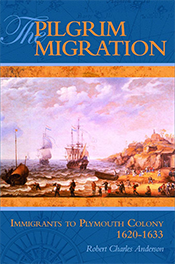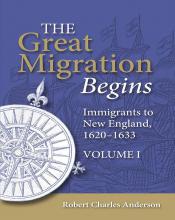JOHN BILLINGTON
ORIGIN: Spalding, Lincolnshire.
MIGRATION: 1620 on the Mayflower.
FIRST RESIDENCE: Plymouth.
ESTATE: In the 1623 Plymouth land division John Billington received three acres as a passenger on the Mayflower [PCR 12:4]. In the 1627 Plymouth cattle division John Billington Senior, Hellen Billington and Francis Billington were the eleventh through thirteenth persons in the seventh company, and John Billington [Jr.] was the tenth person in the ninth company [PCR 12:11, 12].
On 8 January 1637/8, "Mrs. Elinor Billington, widow," deeded to "Francis Billington my natural son . . . all and singular those my land, meadows, pastures and commons with all and singular the appurtenances thereunto belonging situate, lying and being near Plain Dealing within the government of New Plymouth" [PCR 12:28-30]. On 21 September 1638, "Gregory Armestronge, Ellinor his now wife and Francis Billington her natural son" sold to "Mr. William Bradford ... one acre & a half of land lying on the north side of the lands of the said Will[ia]m Bradford upon the lowest division next the water side in the field on the north side of the town of Plymouth" [PCR 12:37-38].
BIRTH: By about 1579 (based on estimated date of marriage).
DEATH: Hanged September 1630 at Plymouth [Bradford 234; WJ 1:43].
MARRIAGE: By about 1607 Elinor___; she married (2) between 14 and 21 September 1638 Gregory Armstrong and was living as late as 2 March 1642/3 [MF 5:34].
CHILDREN:
- JOHN BILLINGTON, b. say 1604; d. Plymouth between 22 May 1627 and September 1630 [PCR 12:12; Bradford 446].
- FRANCIS BILLINGTON, b. about 1606 (deposed 10 July 1674 "68 years of age" [MD 2:46, citing PCR 1:81]); in the Plymouth tax list of 25 March 1633 and 27 March 1634 assessed 9s. [PCR 1:10, 27]; m. Plymouth [blank] July 1634 "Christian Eaton" [PCR 1: 31]. She was CHRISTIAN (PENN) EATON, widow of FRANCIS EATON [PM 187].
COMMENTS: In his list of passengers on the Mayflower Bradford includes “John Billington and Ellen his wife, and two sons, John and Francis” [Bradford 442]. In his 1651 accounting of the Mayflower families, Bradford reported that "John Billington, after he had been here ten years, was executed for killing a man, and his eldest son died before him but his second son is alive and married and hath eight children" [Bradford 446]. (The man murdered by Billington was JOHN NEWCOMEN.)
In a Survey of 1650 for the manor of Spalding in Lincolnshire is a lease for three lives in which one of the lives is "Francis Billington son of John Billington." In describing the three lives involved, we are told that "Francis Billington (as it is informed) was living about a year since in New England aged forty years or thereabouts" [NEHGR 124:116-18]. The estimated age for Francis Billington is probably less accurate than his own deposition in 1674, but this record does provide an excellent clue for further research on the English origin of the family.
Among these incidents the most significant (prior to his committing homicide) was Billington's outspoken support for Lyford and Oldham in their revolt against Bradford and the rest of the Leiden contingent [Bradford 156-57].
BIBLIOGRAPHIC NOTE: The family of John Billington has been treated thoroughly by Harriet Woodbury Hodge (as revised by Robert S. Wakefield) in the twenty-first volume of the Five Generations Project of the General Society of Mayflower Descendants. They list the many occasions on which John Billington or his sons were in trouble with the Plymouth authorities in the first decade of the colony's existence [MF 21:1-4].

The Pilgrim Migration: Immigrants to Plymouth Colony 1620-1633
Buy the print edition of The Pilgrim Migration: Immigrants to Plymouth Colony 1620-1633.

The Great Migration Begins: Immigrants to New England 1620-1633
Buy the print edition of The Great Migration Begins: Immigrants to N.E. 1620-1633 Vols I-III.
Become an American Ancestors.org member to access this biography and over 40,000 more records in the searchable online database of The Great Migration Begins: Immigrants to N.E. 1620-1633 Vols I-III.
This authoritative work by Robert Charles Anderson identifies and describes all Europeans who settled in New England prior to the end of 1633. Each individual or family entry includes (when known) the port or country of origin; when and on what ship they arrived in New England; the earliest known record of the individual or family; their first and subsequent residences; return trips to their country of origin; marriages, births, and deaths; and other important family relationships. This work is available in print and database form on AmericanAncestors.org.




